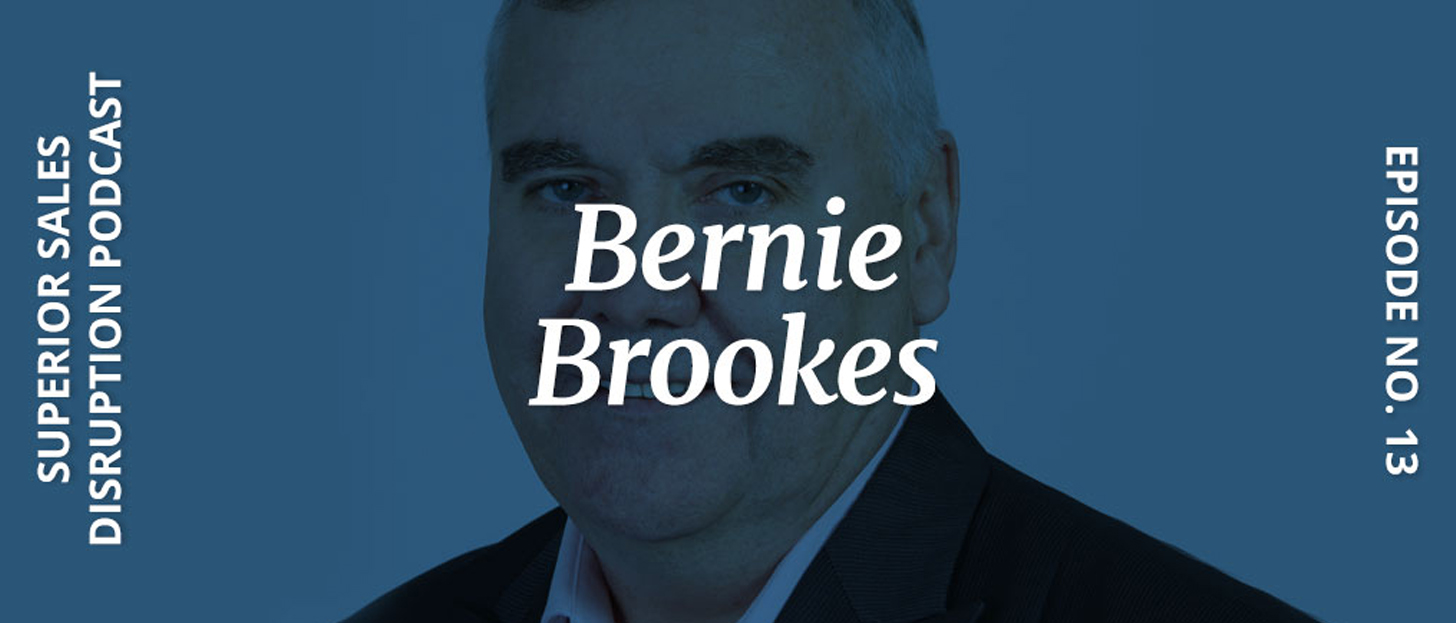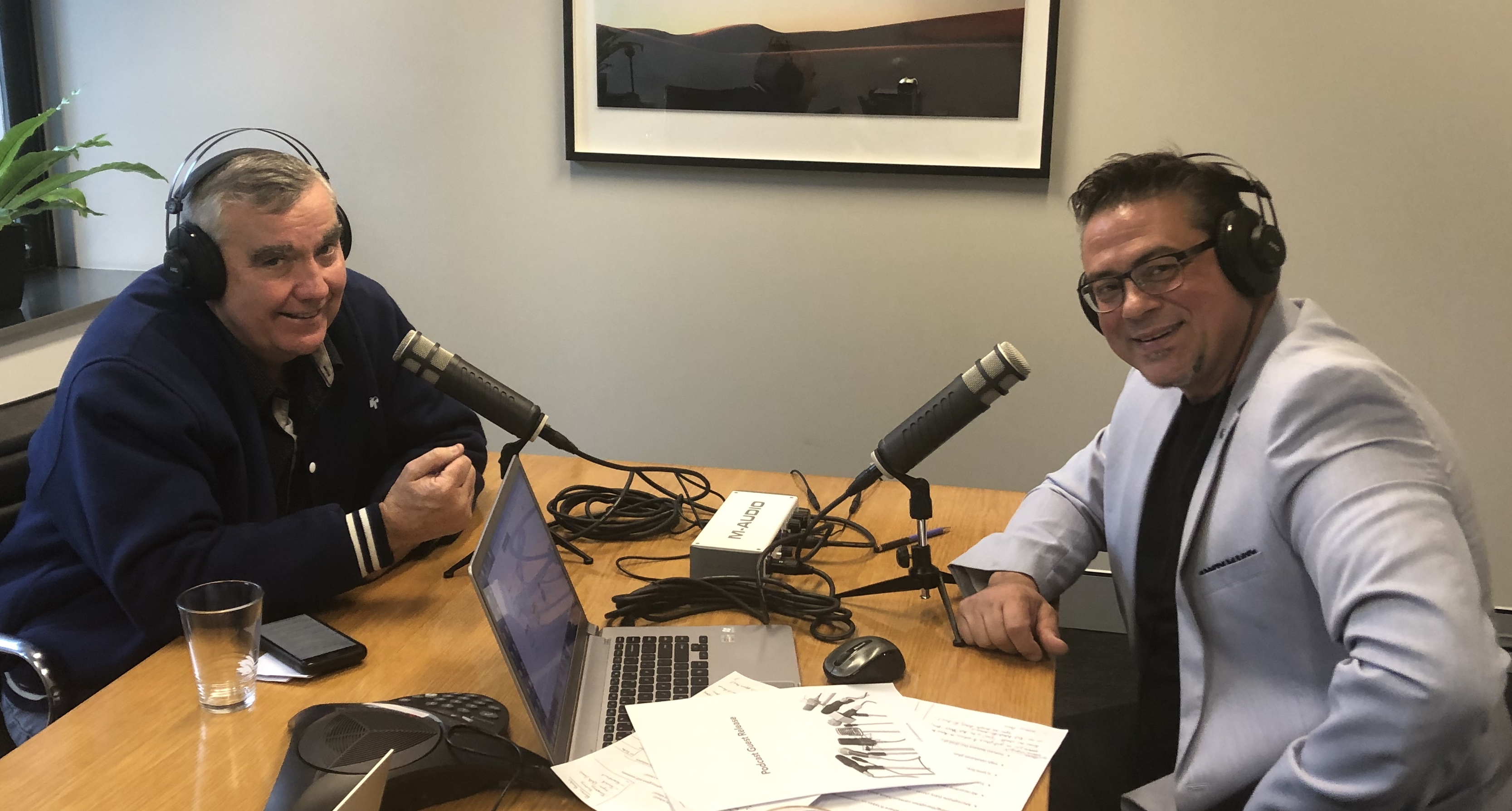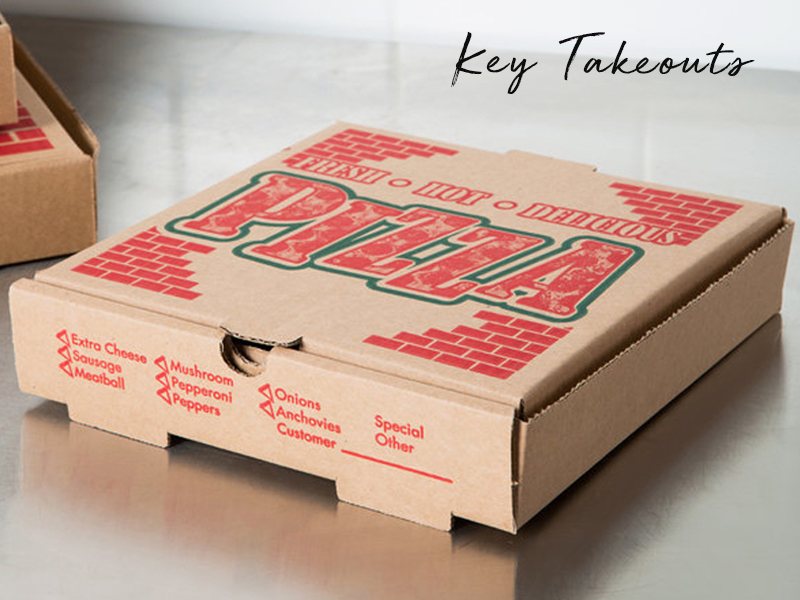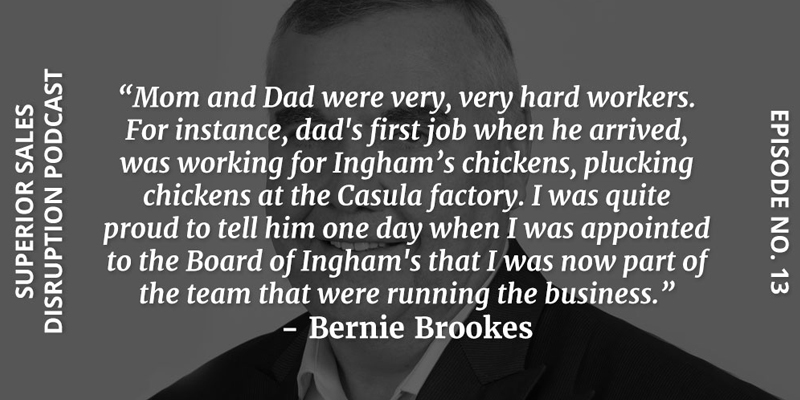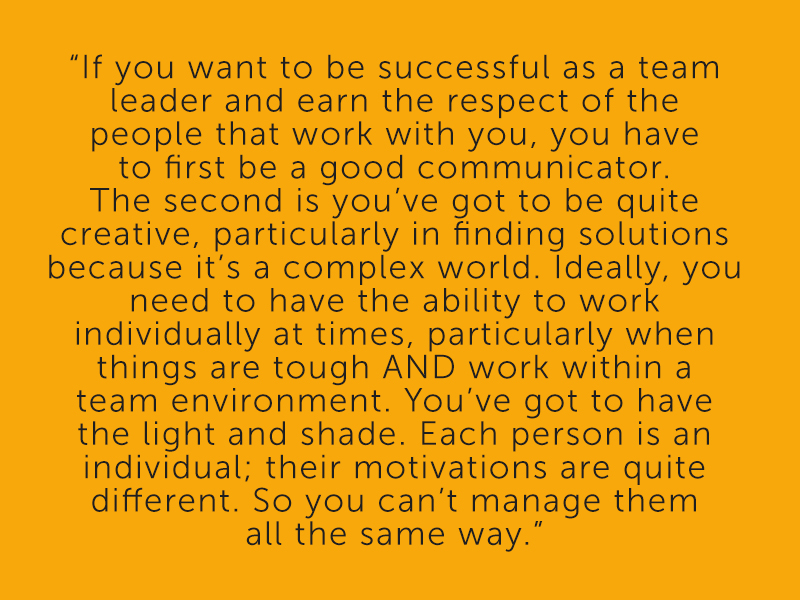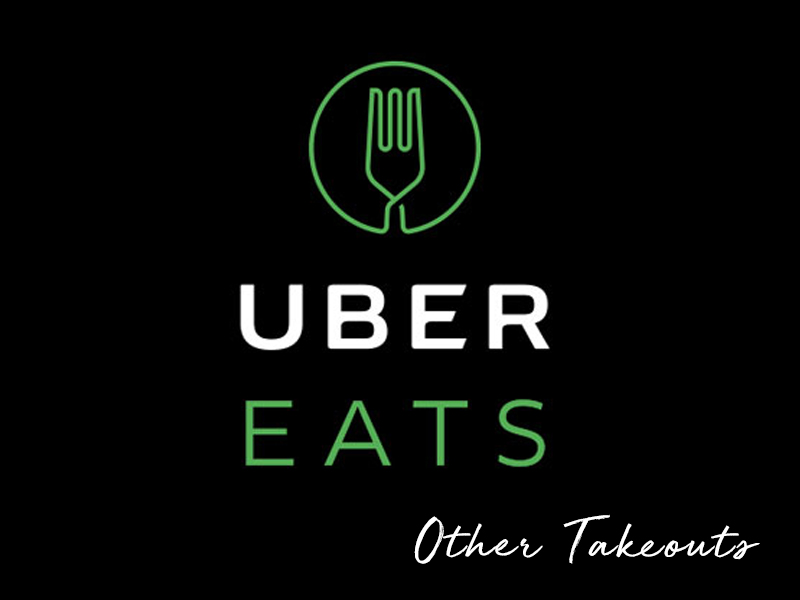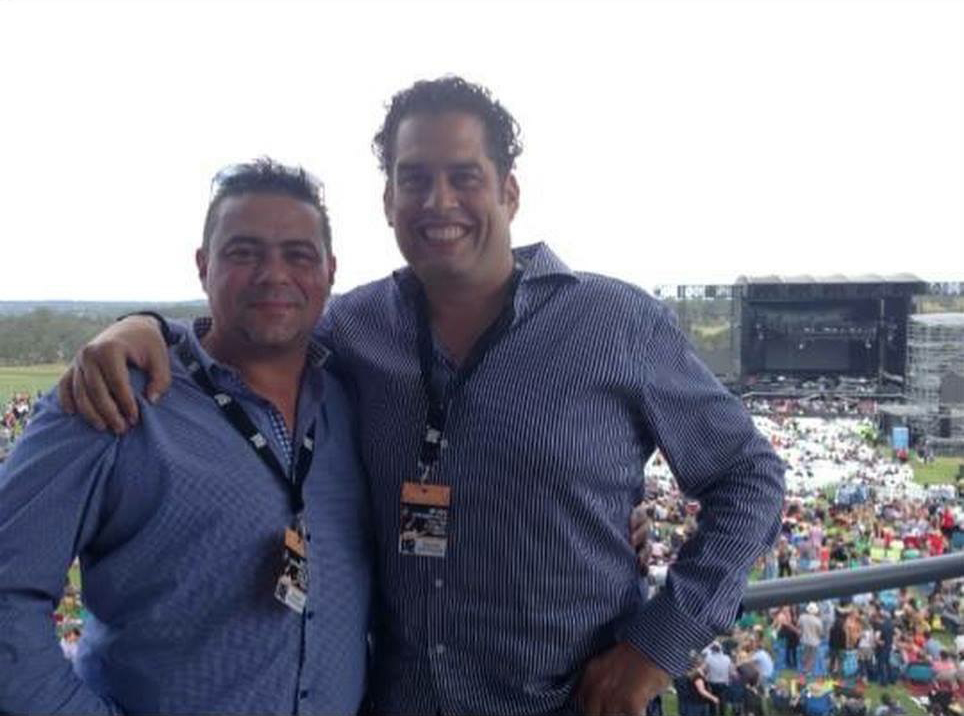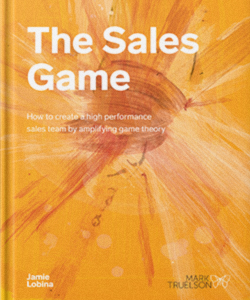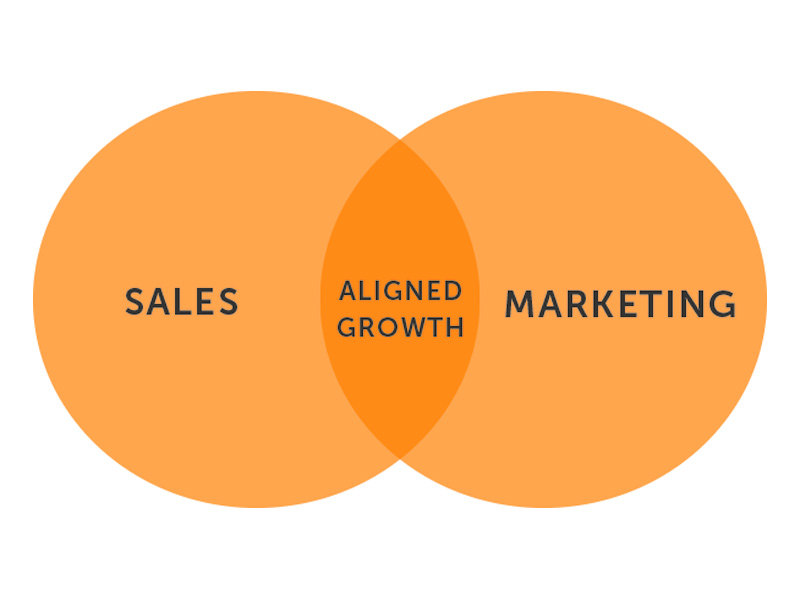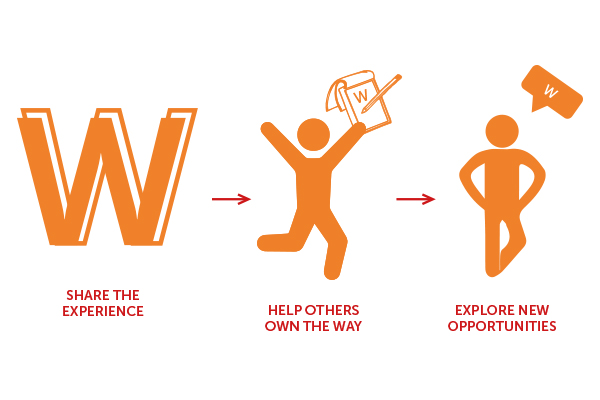Your weekly disruption
Your weekly thought-provoking exploration into building disruptive capabilities.
Bernie Brookes: Inspiration Of A Master
It seems unfair that finding fulfilment at work is like winning Powerball; that only a few lucky ones get to feel valued by their organisations, to feel like they belong. Imagine a world where almost everyone wakes up inspired to go to work, feels trusted and valued during the day, then returns home feeling fulfilled.
Download the podcast on iTunes, subscribe or click to listen: Superior Sales Disruption Podcast – Episode 13
Bernie Brookes is someone who has; but more importantly has been a leader who has ignited such fulfilment. A leader who will ‘eat last’. When it matters most, leaders who are willing to eat last are rewarded with deeply loyal colleagues who will stop at nothing to advance their leader’s vision and their organisations’s interests. It has been the hallmark of Bernie’s career that he has always been able to garner this passion.
Download the podcast on iTunes, subscribe or click to listen: Superior Sales Disruption Podcast – Episode 13
Igniting Pride
Leading Teams
Reverse Mentoring
If you think ongoing learning is all going to be a one-way street, then you’re so very wrong. Let’s just take something like social media, and let’s call it skills on a PC. As I grew up with doing presentations on things like acetate overhead projectors, and where a mobile phone was a big brick, I often have found myself, being reversed mentored in social media, or in podcasts and how you communicate, from people that I’ve mentored. And you talk to them and see how they are going and how their career is passing. But quite often, I found that they’re sort of talking to me about the latest technology, or have you downloaded this app? Or are you using this? If you think you’re not going to learn something from the people that you’re mentoring, then I think you’re selfish, and you’re going to be quite cocooned going forward. So it works both ways. For sure.
Nurturing Future Talent
I’ve been really pleased to watch number of individuals from a career point of view that I’ve started with making the leap to running a Safeway store in Victoria, or becoming the head of the ATO. Or someone that was our impact manager in Victoria, that’s now COO of a large pharmaceutical company. And people such as Greg Foran where I grabbed him from New Zealand, bought him in, worked with him. And then he went on with to bigger and better things running Wal-Mart in the United States. Greg is a great example of someone you can have a bit of an impact on, but then let them go because they’re a butterfly that can go and even go ahead and potentially outfly you and I think that’s fantastic. There are a number of people where you can assist in their career development. But ultimately, the individual crafts their own future; all you can do is remove some of the boom gates for them.
Disrupting Retail
The moment I was most proud of was bringing the Woolworths organisation together as ONE from individual state operations. It was called Project Refresh and the focus was the establishment of shared services. It was a phenomenal and a significant change that had occurred. Coles had undertaken that change a few years before Woolworths and Woolworths were the last to move out of the state-based operations into the centralised structure. This was a difficult time and I remember the first four- or five-months missing budget quite significantly. But then after we got it right and we had some stellar big years at Woolworths under the leadership of Roger Corbett. Project Refresh is where we took out significant costs that re-engineered the supply chain and restructured the business to take the best people into senior category managers. It was a successful period because we were I’ll use the word ‘fair dinkum’ at introducing full category management and category plans with FMCG trading partners. We were tough on trading terms and in the setup harmonisation of trading terms with centralised trading terms. But at the end of the day, what we also did was worked deep and hard with companies such as Nestle and Coca Cola and worked hard on developing category plans. That was the starting blocks for true category management. It has disappeared somewhat today as we have come a little bit tougher to do business. But that was probably the career highlight for me – the establishment of shared services. And then the setup of working with and working in unison with many of our trading partners.
Making The Leap
Even though I loved my tenure at Woolworths, for my learning curve to keep developing, I decided I had to make the leap. I’d like to say it was something more than it actually was. It happened in February 06. Roger Corbett announced that he was retiring, James Strong who passed away a few years ago, was the chairman. And I’d had talks to them about taking Rogers place, but so had Michael Luscombe. And so at the end, the guernsey went to Michael Luscombe. It was great for Michael, and it was great for the company. And it was probably the right decision. But I then had to make a call myself. I’d been at Woollies for 28 years. I had worked in most states, across most businesses operations. And I asked myself whether I was going to be the 2IC again for another 5 to 10 years, or whether I wanted to venture out and do something different and learn something new before I get a little bit too old for it. So fortuitously at that stage, I was talking to Bill Wavish who used to be the CFO at Woollies. He was working with private equity that won the bid for Myer. Bill then became a great support mentor as the chairman of Myer. I was then asked to take over as the CFO once the transaction occurred. And although it was a different area in a learning sense – learning cotton, learning material, learning fashion trends, and colours and style, and a very different, a slower process. The principles of range, price, promotion, and store standards, customer service were the same. I was quite comfortable that I can add some value to the Myer business. And when we bought it, which was June 06 it had lost $66 million, that year and then we IPO’d it for making over $280 million. It was a runaway success for the seller. Myer has had a tough time since that. But there’s no doubt, the four or five years, they were probably the most rewarding and enjoyable time of my life and I met some new people and learned a lot more skills to go forward.
The Rise Of Online
Everybody’s really smart with hindsight and it is easy to talk about how big online is going to be. Our conversations were focused on a need for a website & the need to improve the quality of distribution to the customer. The concept of b2c in a department store was hard because you haven’t got a standard range. I mean, the dresses change every year, the belts the shoes change every year. So there’s no Coca Cola, Mars bars, no standardised range. So it’s a lot more complex to build a significant online offering. And yet, we went about doing that and we launched it. And it got to, before I left, to about 5 or 6% of store sales and what’s up at about 9 or 10% now. The biggest thing I underestimated was the fact that the fulfilment side of it is so much more complex and underestimated by most retailers today. The second thing is the role that online was playing as a true Omni channel environment in getting people back into the stores. Initially we saw it for an opportunity to sell stuff to customers online, where it was a lot more than that, and it took us a long time to come to grips with it. And it took me a long time then to understand that, as it was the very early days of online. We were making a lot of mistakes and we underestimated trying to sell things for $2 with direct profitability means you didn’t make money out of it. So there were a lot of learnings, a lot of failed websites, there was a lot of issues with integrity and pricing and online, people forget that online as we know it today is a pretty well-oiled machine. The reality is early on; there were a lot of miscues, a lot of mistakes, and a lot of money spent in the wrong direction on the wrong things.
A Contrarian View
I have quite a contrarian view to what you read today. I was really pleased last month at the World Retail Congress, to sit on the organising panel and the grand jury for announcing the winners. It was fascinating that some of the start-up companies that we had awarded previously were now defunct. There is still enormous dynamics to go in that online space, and particularly pure play operators who are now moving into buy bricks and mortar. Amazon being probably the best example. So, the one change that occurred in the presentations last month in Amsterdam, was a good portion were talking about a maturity of direct online sales. And coming back now to needing bricks and mortar. People 4-5 years ago were talking about the death of bricks and mortar retailing. Even if you look at the best country in the world, for sale online sales like Korea, it gets to about 16 to 18%, the UK at about 11-12%, the US just on double digit, Australia between 8-10%. There is a levelling out. And if you look at the annual reports in Australia, of all the major retailers, you can see that the 40/50/100% growth that we’re getting in online is now 10% 12% 8%. What’s happening is their online growth is not compensating for the deterioration of bricks and mortar growth. And so what we’ll probably see is that 10 to 15% level of online sales, 85% bricks and mortar with a high combo between the two of them. So I think the concept of everybody buying online in years to come and I think is going to be quite, quite wrong. I think what we’ll see is, traditional bricks and mortar will be an important part of the go forward. Sure they’ll be the levelling out of the rents and sure they’ll be the levelling out of the services provided. But at the end, I think waters will find its own level. The second part is even more interesting in regard to the digital world. And, and it’s funny, we’re just going through a tender for a business that I chair, at Flannery’s, which is an organic food business, and all of that advertising tender is on digital marketing. There is no traditional Press TV, radio marketing, it’s all done through a digital environment. And I think that’s where the biggest change is going to occur. It’s the way in which you communicate to customers and market to customers, rather than through the way you buy stuff.
Bricks and Mortar is not Dead
Online is particularly good from an educational point of view. If you’ve got water on the knee, you can look up and you get a get a celery capsule. The medicinal area is going to be very strong in personal contact. I look at the Flannery’s business; we now have three naturopaths in each of the stores. They are very busy people and they provide advice and help and education. And I think that’s where we’ve got an advantage over Woollies Coles. They do not have the level of trust from customers, particularly in this organic natural space. If you look at some of the Romeo’s and some of the IGA stores now they are really building a good business out of being able to sell gourmet and unique products and provide that with specialist advice, whether it is the cheese specialist or the seafood specialist. That should be what Woollies and Coles own. But they’ve gone downhill in the last few years in trying to own that space. And it’s been given away to good businesses like Harris Farm, and some of the good IGA stores that are around.
David Jones and Myer has become the sort of whipping boy for bricks and mortar. Yet they are still doing four and a half billion dollars in turnover in the Australian marketplace. So for all of the bad bits that everybody talks about them about not having identity, not moving fast enough in the digital space, having poor customer service, there’s still a significant chunk of change being done in doors. The one thing that took us from minus 66M to plus $280 million at Myer was our ability to increase personal shopping, to have some fantastic world class designers in our store that provide that advice, to have fashion shows and events, to have theatre in store to have a great events at the race meeting, really had what I would call that art of theatre, and retail entertainment. This has been lost recently as cost reductions hit hard. And you don’t have that sort of celebrity presence anymore. And so naturally, people like your daughter are going to say, well, why would I want to go to the old Fuddy duddies store, when I can go online and buy something and if it doesn’t fit or it’s wrong colour I can return it. So I think they’ve become masters of their own destiny. Myer and David Jones has become a self-fulfilling prophecy where they’re going to attract the wrong customer, because they’ve been too focused on reducing costs, reducing range and not using what was the epitome of department stores. That being theatre entertainment. The piano player in the middle of David James having somebody that can give you advice that can style you that can personally tell you what cosmetic to wear, right the way through to what dress goes with what shoes.
The keys to success
The most important thing to me is when you get a little bit older and a little bit grey here, and you want to work with nice people, and you don’t need to put up with ‘dicks’. You don’t need to put up with people that have got an arrogance or treat people unfairly or unrelenting and ruthless. To some extent, the first thing that I will do, and I fact I did it last week was spend, six or eight hours with the people that run the company and the other board members to make sure that I was really comfortable in that environment. The second thing is you’ve got to be able to add value. I don’t sit on any list of company boards deliberately, for the simple reason that if you’re sitting on a name, a Commonwealth Bank, or a Coca Cola, it’s all governance and signing things and directors and officer’s insurance. A board’s job should be to assist and mentor management and assist and mentor the strategy. And you can’t do that in a public company so private companies provide a greater opportunity. So be able to install things, be able to work with the management and work with people that you like, I think is the sort of criteria that I would put forward.
I’ve been incredibly lucky. Sometimes I’ve created that luck sometimes I’ve been lucky. But to win the Joe Berry award, to win what was called then the Uncle Ben scholarship and get overseas study tours for both of those businesses, to have the opportunity to set up a business in India to spend two years setting up offices in China. And then more recently spent three years in Africa across 16 countries running retailer groups. I’ve been credibly fortuitous. And so therefore, the first part is giving back as I’ve been doing with the United Nations, and certainly doing by getting back into the Joe Berry award. And certainly I think that gives me a great degree of comfort as I give back to a lot of the younger people in the business. Now they’re throwaway lines, they’re cheap lines. But ultimately, I’m quite confident in saying that the work I’m doing in some of those areas is getting some great results with some good young executives. The Joe Berry award is a great example of that. So continue to give back. Continue to support. And at the same time, I think I’ve got a bit of making up to do with my wife and kids and grandkids who are aware I’ve spent so much time away. So I’m also doing a bit of what I call guilt catch up in that area as well.
So many great takeaways from this conversation. Listen to the episode in the player below, or download, subscribe and enjoy it on iTunes.
Download the podcast on iTunes or click to listen: Superior Sales Disruption Podcast – Episode 13
If you want your Sales team to Gamify it’s performance please contact us at https://www.superiorsales.com.au/contact-us/
Next week we are going to delve deeper into the elements of Creating The Game.
If you are looking at running a Sales Game workshop either email Mark at mark.truelson@superiorsales.com.au OR dig for more information at https://www.superiorsales.com.au/storytelling/workshops/
At Superior Sales we build programmes leveraging all the core drivers of capability – organisation, people, process and culture, not just skills. Refer to our white paper at https://www.superiorsales.com.au/storytelling/whitepaper/
At Superior Sales our capability experts work extensively with companies to equip sales teams, and indeed the whole organisation, to deliver a better customer experience. Please get in touch at https://www.superiorsales.com.au/contact-us/
Happy Weekend!
Your weekly disruption.
Register your details to receive your weekly thought-provoking exploration into building disruptive capabilities, Straight into your inbox.

